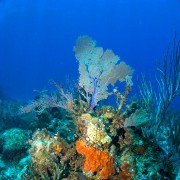 Photo: Getty Images
Photo: Getty Images
Part one of a two-part series on the human-ocean health connection
I'll just say it. I’m hopelessly in love with the oceans--all of them.
The euphoric and yet exhilarating feeling I get from touching the waves, hearing its crash on the beach and catching a whiff of the soft breeze can only be compared to the experience of diving deep into its vastness. It’s hard to catch one’s breath when there is a magnitude of wonder all around you.
I’m hooked and there is no going back.
So naturally, I am concerned about our oceans’ health. Simply put, we all need the oceans to exist. (For starters, they are the primary reason this planet is inhabitable in the first place.) For the past 50 years we have done an incredibly apt job of taking its bounty and giving back our worst garbage. Now the oceans are at the tipping point of survival.
The impact man-made pollution is having on critical global waterways will ultimately be our demise if we don’t take action to change it. But we are contributing to our collective undoing in another way; we may be unknowingly destroying some of our richest resources to treat and cure human disease such as cancer, AIDS and other chronic illnesses.
“We've only begun to realize the possibilities there are for new drug discoveries in the ocean. It's like the rain forests, where plants and animals that could hold the keys to new drugs are becoming extinct every day. We have the same potential in the oceans, the least-explored and understood environments in the world,” said Dr. Peter McCarthy, senior research scientist at Harbor Branch Oceanographic Institute in Fort Pierce, Florida.
McCartney and colleague, Dr. Amy Wright, also a senior research scientist at Harbor Branch, discovered unique chemical compounds in sponges found in the Indian Ocean that provide treatment for fungal infections that threaten the lives of AIDS and cancer patients and others with compromised immune systems.
As more people suffer from diseases of the immune system or immune system suppression as a result of undergoing treatment for other diseases, the need for antifungal agents is greater than ever before. If these patients are exposed to everyday fungi that exist all around us, like bread mold or yeast, they can develop dangerous—even life-threatening— lung infections.
Wright says it makes perfect sense that a sponge would have chemicals to fight off predators, since it’s anchored to the ocean floor and can’t run away from natural predators or pathogens. So over time they have evolved to make homemade poisons to fight their enemies. The researchers believe sponge extracts can be developed into therapies that are less toxic to humans than current remedies and produce wider ranging results.
John Allingham, a researcher at University of Wisconsin-Madison agrees. “These marine toxins can knock out the lynch pins in long chains of cancer cell growth or cap their ends and kill cancer cells. Moreover, initial work shows that even a low dose of these toxins can bring a significant response.”
Similarly, researchers at Scripps Institution of Oceanography at the University of California San Diego have shown for the first time that deep ocean sediments are a significant biomedical resource for microbes that produce antibiotic molecules. The new compound is a potent inhibitor of cancer growth, including human colon cancer, non-small cell lung cancer, and most effectively, breast cancer.
“This is likely to be the tip of the iceberg of diverse chemical formulas that are out there,” said William Fenical, a professor and director of the Center for Marine Biotechnology and Biomedicine at Scripps.
While studying sea creatures in Fijian waters, scientists in Luxembourg and the South Pacific discovered the marine life not only have certain anti-cancer compounds that can be used in therapy, but others may also be useful for improving drug delivery, currently one of the most significant problems faced by medical researchers.
The team focused on finding compounds that interfere with a particular protein known to have a critical role in many cancer types, as well as other diseases, including inflammatory bowel disease, arthritis and asthma. Dr. Marcel Haspars from University of Aberdeen said sponges, soft corals and sea lilies all have natural compounds responsible for allowing normal cell death that switches off some cancerous cells.
“We have only scratched the surface of the chemical diversity in the ocean,” says Hendrik Luesch, an assistant professor in University of Florida’s department of medicinal chemistry. He has several anti-tumor products in the pipeline that’s derived from cyanobacteria that grow on coral reefs found off the coast of Key Largo. “The opportunities for marine drug discovery are spectacular.”
Lynette Summerill is an award-winning writer and marine fanatic living Scottsdale, Arizona. In addition to writing about cancer-related issues, she writes a blog, Nonsmoking Nation, which follows global tobacco news and events. When not writing, she is dreaming about her next diving expedition.






Add a CommentComments
There are no comments yet. Be the first one and get the conversation started!